
I Corps was an army corps in existence as an active formation in the British Army for most of the 80 years from its creation in the First World War until the end of the Cold War, longer than any other corps. It had a short-lived precursor during the Waterloo Campaign.

The Killer Angels is a 1974 historical novel by Michael Shaara that was awarded the Pulitzer Prize for Fiction in 1975. The book depicts the three days of the Battle of Gettysburg during the American Civil War, and the days leading up to it: June 29, 1863, as the troops of both the Union and the Confederacy move into battle around the town of Gettysburg, Pennsylvania, and July 1, July 2, and July 3, when the battle was fought. The story is character-driven and told from the perspective of various historical figures from both the Confederacy and the Union. A film adaptation of the novel, titled Gettysburg, was released in 1993.
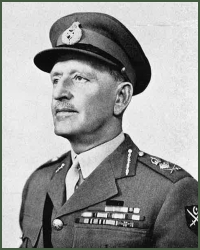
General Sir Douglas David Gracey & Bar was a British Indian Army officer who fought in both the First and Second World Wars. He also fought in French Indochina and was the second Commander-in-Chief of the Pakistan Army. Gracey held this latter office from 11 February 1948 until his retirement on 16 January 1951. Born to English parents living in India, he was educated in English schools before returning to India to serve in the military there.

Nelson Appleton Miles was an American military general who served in the American Civil War, the American Indian Wars, and the Spanish–American War.

Middle East Command, later Middle East Land Forces, was a British Army Command established prior to the Second World War in Egypt. Its primary role was to command British land forces and co-ordinate with the relevant naval and air commands to defend British interests in the Middle East and eastern Mediterranean region.
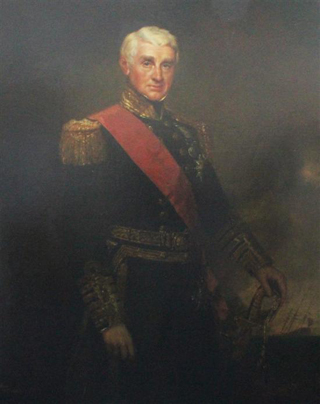
Admiral of the Fleet Sir Thomas John Cochrane was a Royal Navy officer. After serving as a junior officer during the French Revolutionary Wars, he captured the French ship Favourite off the coast of Dutch Guiana and then took part in various actions including the capture of the Virgin Islands from Danish forces, the capture of the French island of Martinique and the capture of the French archipelago of Îles des Saintes during the Napoleonic Wars. He also took part in the burning of Washington and the attack on Baltimore during the War of 1812.

General Sir John Eccles Nixon was a senior commander of the British Indian Army. He gave the orders for the ultimately disastrous first British Expedition against Baghdad during the First World War.

Carl Hilpert was a German general during World War II.
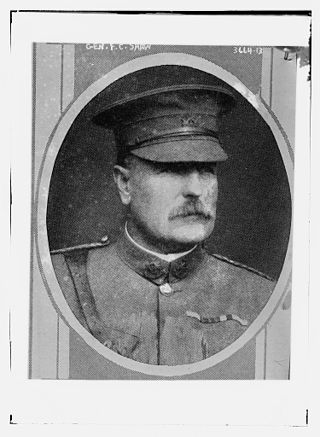
Lieutenant General Sir Frederick Charles Shaw was a British Army general who served in the Boer War and the First World War. He became Commander-in-Chief, Ireland, and retired in 1920.

Lieutenant General Harbaksh Singh, VrC was a senior General Officer in the Indian Army. As the Western Army Commander, Singh commanded the Indian Army forces and played a key role during the Indo-Pakistani War of 1965. For his role in the war, he was awarded the Padma Vibhushan in 1966.
The Deputy Commander Field Army is a senior British Army officer who serves as deputy to the Commander Field Army. It currently is held by an Army Reserve officer.
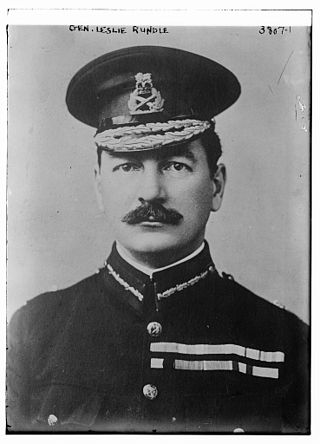
General Sir Henry Macleod Leslie Rundle, was a British Army general during the Second Boer War and the First World War.
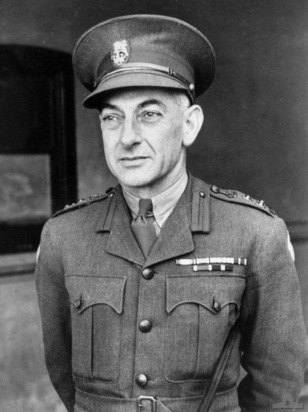
Major General Sir Jack Edwin Stawell Stevens, was a senior officer in the Australian Army during the Second World War. He was best known as the commanding officer of the 6th Division from 1943 to 1945.

Force Troops Command was a combat support and combat service support command of the British Army. Its headquarters was at Upavon, Wiltshire. It was formed in 2013 as a re-designation of the previous Headquarters Theatre Troops. Force Troops Command was renamed as 6th Division in August 2019.
Major-General (Norman) Hamish Rollo CBE was a British Army officer who became General Officer Commanding, Theatre Troops.

Lieutenant General Sir Mark William Poffley, is a former senior British Army officer.
Major General Carl Gunnar Ferdinand af Klintberg was a Swedish Army officer. His senior commands include commanding officer of Svea Artillery Regiment, the Royal Swedish Army Staff College as well Deputy Force Commander of the United Nations Operation in the Congo (ONUC). af Klintberg also served as the Inspector, Army Signal Troops.

James Phillips Berkeley was an officer of the United States Marine Corps who attained the rank of lieutenant general. He is most noted as Signal Officer of 5th Marine Division during the Battle of Iwo Jima and later as commanding general of Fleet Marine Force, Atlantic. He was the son of Medal of Honor recipient, Major General Randolph C. Berkeley.
Kunibert Randewick was a German Signals officer before and during World War II who was responsible for the establishing of several intercept out-stations and later becoming commander of all KONA regiments in the west. He would eventually achieve his wish of becoming Chief Signals Officer. Randewick was involved in the design of radio components of the V-2 rocket, specifically researching remote control via wireless steering, remote detonation and remote jamming. At the start of World War II, Randewig was already a veteran of Soviet Wireless telegraphy traffic and a supporter of decentralisation.

Major General Susan May Coyle, is a senior officer in the Australian Army. She joined the army as a reservist in 1987 and, following training at the Australian Defence Force Academy, was commissioned into the Royal Australian Corps of Signals in 1992. She has commanded the 104th Signal Squadron (2003–04), 17th Signal Regiment (2009–10), Task Group Afghanistan (2015) and the 6th Combat Support Brigade (2017–19), and has deployed on operations to East Timor, the Solomon Islands and Afghanistan. She was appointed Commander Joint Task Force 633, with responsibility for all Australian operations in the Middle East, from January to November 2020. She was the first woman to command the task force, which had oversight for 1,200 personnel under Operation Accordion. Coyle was Head Information Warfare from January 2021 to November 2022, when she was appointed Commander Forces Command.















